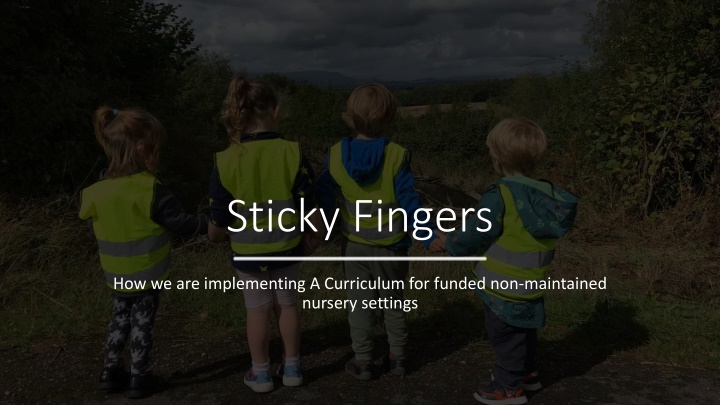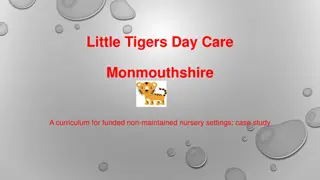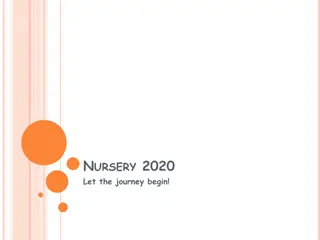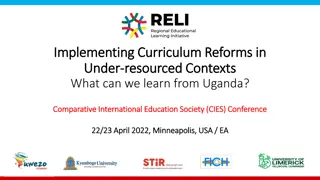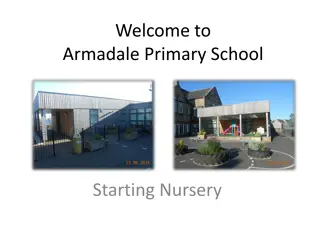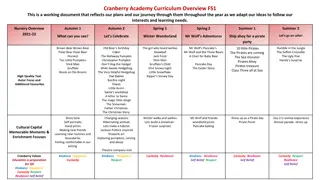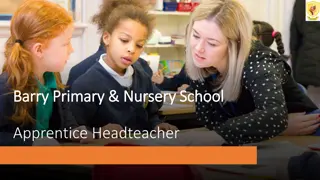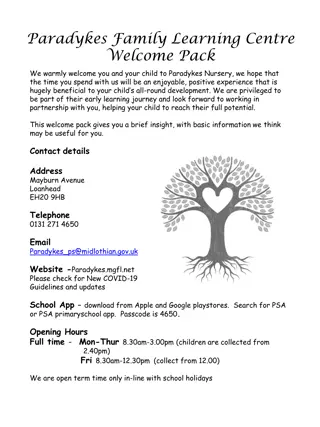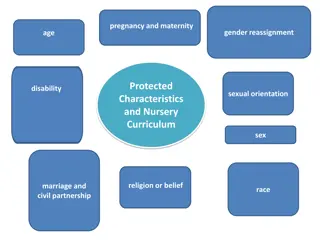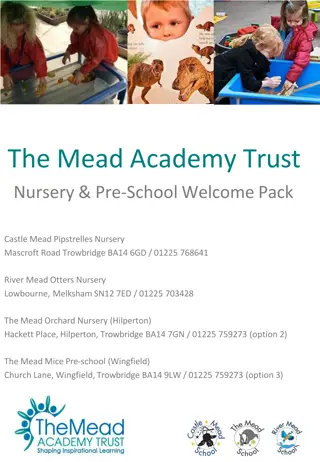Implementing a Curriculum for Funded Nursery Settings
This curriculum aims to help children develop as ambitious, capable learners, enterprising, creative contributors, ethical, informed citizens, and healthy, confident individuals. It emphasizes enabling adults to positively impact children's well-being, creating effective environments, providing engaging experiences through play-based learning, and the significance of outdoor activities for children's holistic development.
Download Presentation

Please find below an Image/Link to download the presentation.
The content on the website is provided AS IS for your information and personal use only. It may not be sold, licensed, or shared on other websites without obtaining consent from the author.If you encounter any issues during the download, it is possible that the publisher has removed the file from their server.
You are allowed to download the files provided on this website for personal or commercial use, subject to the condition that they are used lawfully. All files are the property of their respective owners.
The content on the website is provided AS IS for your information and personal use only. It may not be sold, licensed, or shared on other websites without obtaining consent from the author.
E N D
Presentation Transcript
Sticky Fingers How we are implementing A Curriculum for funded non-maintained nursery settings
Four purposes This curriculum aspires to help children to develop as: Ambitious, capable learners Enterprising, creative contributors Ethical, informed citizens Healthy, confident individuals
Enabling adults We can have a positive impact on children s well-being, through being consistent in our care and modelling compassion and kindness. We should demonstrate respect for children, by supporting their decisions and choices. We should always look to maximise learning opportunities in these daily routines.
Effective environments The environment we create in our setting, indoors and outdoors, should be central to children s authentic experiences. During the early years, exploration of the environment is a key driver for development. These environments will provide for wide and varied experiences that allow children to express themselves physically, creatively and imaginatively, and allow them to safely follow their interests, independently or with others. We should offer opportunities for children to experience a sense of awe and wonder and which ignite curiosity about the world, motivating children to explore, solve problems, and develop their creativity and critical thinking.
Play is a fundamental right for all children. They have a strong intrinsic need to play. Through play and playful experiences, children find ways to explore a range of emotions and learn about the world they inhabit with others. Pedagogy - play and play based learning We should all value play, both as an end in itself and as something that we can observe closely with the clear aim of enhancing learning.
Pedagogy - being outdoors Being outdoors is particularly important for young children. It supports social, emotional, spiritual and physical development, as well as well-being. Being outdoors can also support high levels of confidence and engagement. In an outdoor environment, children can explore, practise and enhance their skills. The outdoors provides opportunities to inspire awe and wonder, and allows children to be themselves in open, relaxed and stimulating spaces. The outdoors provides rich and authentic opportunities to stimulate children s senses through what they hear, touch, see and smell. Children who are able to engage and connect with the natural world can build an empathy for the environment and develop awareness of their potential impact on the world. They can begin to explore the concept of sustainability in a practical way. Exploring the outdoors provides opportunities for children to develop a sense of place within their immediate surroundings, their locality, Wales and the wider world.
Pedagogy authentic experiences We know that children learn well when actively engaged in experiences that stimulate their interest, ignite imagination and inspire curiosity. These experiences should encourage children to investigate, explore, create and be active participants in their learning. Relevant and meaningful experiences that are rooted in real-life contexts will enable children to make connections, apply knowledge and consolidate skills. Real-life experiences can enable children to take the lead in asking questions, identifying problems, taking risks and finding solutions. Creating opportunities for children to apply what they are learning to real-life situations helps them understand the purpose of their learning and can enhance well-being, self-esteem and resilience. It encourages exploration and creativity and will support children to develop an understanding of the world around them.
Pedagogy physical literacy
Pedagogy physical literacy Children need opportunities to develop a wide range of fundamental movement skills, which are the basis for moving with competence and confidence in everyday life.
Pedagogy physical literacy It is essential for us to lay the foundations of physical literacy in the early years through modelling positive attitudes towards movement and providing an environment that gives children the opportunity to explore, practise and consolidate a wide range of physical movements in a variety of contexts. This should include creating time, space and opportunity for children to experience a range of play types, for example rough and tumble, exploratory and risky play, exploring the world from different levels, and experiencing a range of positions, movements and contexts that motivate them to move.
Cross-curricular skills - numeracy Children are naturally inquisitive and develop an understanding of mathematical language, concepts and skills through multi-sensory play and authentic experiences. Children should experience daily outdoor play opportunities to encourage their further exploration of mathematical concepts in everyday life. Within the natural world, there are a wealth of opportunities for mathematical development. Open-ended, natural resources offer endless possibilities for mathematical exploration. With our support, and by providing an engaging environment, children can discover and understand that maths is everywhere. Modelling appropriate mathematical language and skills throughout the day will help children develop their strategic competence. When developing mathematical understanding, it is imperative that we give children the time to observe, explore, investigate and experiment to work through the process of problem-solving. This problem-solving process should be valued in itself and may not result in an outcome or answer.
Cross-curricular skills digital competency Digital competence is a set of skills, knowledge and attitudes that enables the confident, creative and critical use of technologies and systems. Digital competence is essential for children if they are to be informed, capable and have the potential to be successful in today s society. Digital competence focuses on developing digital skills that can be applied to a wide range of situations relevant to their world and should not be confused with information and communication technology (ICT).
Cross-curricular skills- literacy Language and communication is key to learning. Speech, language and communication should be developed holistically through real-life authentic experiences and play opportunities. We have a crucial role in providing the building blocks for language, beginning with supporting attention, listening and understanding. We can do this by ensuring that children are immersed in rich language experiences and activities to develop their listening, speaking and communication skills. When developing language and communication, we should ensure that children are given time to process what they hear and see, before responding, reflecting and revisiting. We must understand that some children will also communicate by means other than speech.
Cross-curricular skills - literacy The natural world provides a wealth of opportunities for language development through playful experiences, such as the crunch of a leaf or the splash of a puddle. The use of the outdoors promotes well-being, self-esteem and the confidence to communicate. The freedom of the outdoors can lower inhibitions and allow children to express themselves. We should support and encourage children to foster a love of books and stories through shared reading with individuals and small groups. Books and authentic reading materials, including those created by the children themselves should be available throughout the environment. We should value the stories that children tell through their play.
Cross-curricular skills - literacy We know that gross motor skills, such as climbing, spinning and throwing, are integral to the development of fine motor skills and mark-making. We can support this development through ensuring children have opportunities to develop pre-requisite skills for mark-making, such as manipulating clay and dough, and through messy play and activities that help to develop grip. We should provide opportunities for mark-making across a variety of contexts and for a variety of purposes, with a range of tools and media. All children should have opportunities to develop an awareness that Wales has two official languages and that many other languages are spoken in our communities. We have a responsibility to ensure children develop positive attitudes towards different languages and towards the people who speak them. Language skills learned in one language should support the development of knowledge and skills in another language.
Child-centred practice notice, analyse, respond
Child-centred practice - schemas In our practice, there may be times when we wonder why young children do what they do. We may observe a child repeating an activity over and over again, for example tipping over containers and emptying contents on the floor, making circles in the sand or paint, wrapping themselves or objects up in fabric. These repetitive actions support vital brain development and are called schemas. These actions may seem a little odd, or even a little irritating, at times, but to a child they are a necessary step in their understanding of the world and themselves. Schemas can support children to express their developing ideas and thoughts through their exploratory play. The repetitive actions of schematic play allow children to construct meaning in what they are doing.
Child-centred practice -Schemas Some children have a very strong drive to repeat actions such as lining objects up, moving things from place to place, filling and emptying containers, covering things or throwing them. Schemas may change over time, for example a child may experiment with a particular schema such as enveloping themselves in blankets before moving on to enveloping objects of varying sizes in fabric, paper or paint. As children integrate new learning into existing schema, they adjust their current thinking to accommodate these new experiences.
Child-centred practice assessing children
Looking forward to sharing our journey with you as it continues to grow
